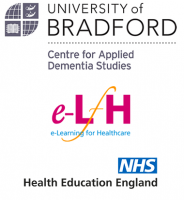Enabling People to Live Well with Dementia | Dementia Identification, Assessment and Diagnosis



This session explores the identification, assessment and diagnosis of dementia and the benefits of an early diagnosis. Later, it will investigate what the assessment process entails and how it is experienced by people with dementia, stressing why it is important to ensure sensitive, person-centred assessment and appropriate and timely post-diagnostic support.
Learning Objectives
By the end of this session you will be able to:
- Identify the most common progressive brain diseases which cause dementia symptoms
- Describe the signs and symptoms of dementia that indicate the need for assessment
- Explain why early diagnosis of dementia is beneficial and the possible outcomes if assessment and treatment is delayed
- Know about the key difficulties people living with dementia face as dementia progresses
- Describe the criteria and process used to gain a diagnosis of dementia
- Explain why it is important to treat people undergoing diagnosis with sensitivity and in a manner appropriate to them
- Explain how to refer patients to access specialist services and support networks
In this session, we will describe a person-centred approach to the identification, assessment and diagnosis of dementia, the benefits of an early diagnosis, including accessing support and services, and outline the difficulties people face over time living with a progressive brain disease.
This session has been mapped to the Dementia Training Standards Framework and is designed to support the Dementia Action Alliance Dementia Statements.
Before commencing this session you may wish to:
- Complete Module 1 - Introduction to Living with Dementia/Dementia Awareness (407-0030)
Murna is a Professor in Dementia Studies at the Centre for Applied Dementia Studies at the University of Bradford. Her research interests focus on improving quality of life and quality of care for people with dementia and their families. Recent research includes approaches to improving transitions in dementia care; improving health care for nursing home residents; promoting independence for people living with dementia in the community; and the effectiveness of the University's practice development methodology, Dementia Care Mapping, in implementing person-centred care in care homes.
Murna has published on a range of topics including the perspective of the person with dementia, early diagnosis, long term care, end of life and transitions in dementia care. She is co-editor of the textbook 'Excellence in dementia care: Research into practice' and is series editor of the University of Bradford Jessica Kingsley Good Practice Guides on Dementia Care. She is an ambassador for the Alzheimer's Society, serves on the Research Advisory Council of the Alzheimer's Society, is an adviser to Alzheimer Europe, and is a member of the National Institute for Health Research Portfolio Development Group for the Dementia and Neurodegenerative Diseases Research Network (DeNDRoN). She was recently awarded an outstanding achievement award by the British Society of Gerontololgy.



- Acute Medicine | Respiratory | Cough: Investigatio...
- Posted By eIntegrity Healthcare e-Learning
- Posted Date: 2025-01-15
- Location:Online
- This session focuses on the causes of acute and chronic cough and describes the investigation and management of cough.
- Acute Medicine | Respiratory | Importance of good ...
- Posted By eIntegrity Healthcare e-Learning
- Posted Date: 2025-01-15
- Location:Online
- This session focuses on the importance of taking a good history when reviewing a patient with a cough.
- Acute Medicine | Respiratory | Common and serious ...
- Posted By eIntegrity Healthcare e-Learning
- Posted Date: 2025-01-15
- Location:Online
- This session focuses on understanding and recognising the common causes of cough and the underlying risk factors.
- Acute Medicine | Respiratory | Management of drug ...
- Posted By eIntegrity Healthcare e-Learning
- Posted Date: 2025-01-15
- Location:Online
- This session discusses the investigation and management of patients with drug induced breathlessness, a commonly overlooked presentation with potentially long-term adverse drug effects. The session looks at how to interpret test results to confirm the dia
- Acute Medicine | Respiratory | Drugs that can caus...
- Posted By eIntegrity Healthcare e-Learning
- Posted Date: 2025-01-15
- Location:Online
- This session looks at drugs commonly associated with causing shortness of breath, the underlying pathogenisis of the pulmonary drug reaction and clinical manifestations.






